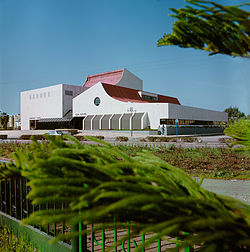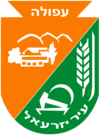'Afula
Afula
|
||
|---|---|---|
| Hebrew transcription(s) | ||
| • ISO 259 | ʕapula | |

Afula cultural center
|
||
|
||
| Coordinates: 32°36′23″N 35°17′17″E / 32.60639°N 35.28806°ECoordinates: 32°36′23″N 35°17′17″E / 32.60639°N 35.28806°E | ||
| Grid position | 177/224 PAL | |
| Country | Israel | |
| District | Northern | |
| Founded | 1900 BCE (ancient settlement) Ottoman period (Arab village) 1925 (Zionist colony) |
|
| Government | ||
| • Type | City | |
| • Mayor | Yitzhak Meron | |
| Area | ||
| • Total | 26,909 dunams (26.909 km2 or 10.390 sq mi) | |
| Population (2015) | ||
| • Total | 44,930 | |
Afula (Hebrew: עֲפוּלָה, Arabic: العفولة) is a city in the Northern District of Israel, often known as the "Capital of the Valley" due to its strategic location in the Jezreel Valley. In 2015 the city had a population of 44,930.
Afula is mentioned first around 19th century BC as "Ofel" in the Execration texts.
During the Ottoman era, in the 18th century, there was a small Arab village el-'Afuleh or Affule, in this region. The modern name may be derived from the name of this village, possibly originating in the Canaanite-Hebrew root ofel ("fortress tower"), or the Arab word for "ruptured".
Afula is possibly the place Ophlah, mentioned in the lists of Thothmes III.Conder suggested that Afula was identical with Kirjath Ophlathah, a place inhabited by Samaritans in the 7th century.
Within the town of Afula, on the ancient mound or tell known as Tel 'Afula, remains of a fortress from the Crusader and Mamluk periods have been discovered. A fortified Crusader tower, 19 meters square, stands in the centre of Afulah. The lower four courses are made of rough boulders, while the top remaining layer is made of reused Roman sarcophagi. The wall is a total of 5,5 meters tall. Pottery remains indicate that it was occupied in the twelfth and thirteenth century. For older finds from Tel 'Afula see the Archaeology paragraph.
In 1321, Afula was mentioned under the name of Afel by Marino Sanuto.
...
Wikipedia


